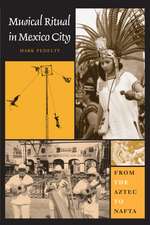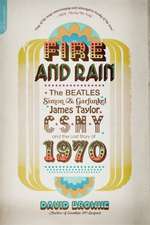The Music of Nature: Or, An Attempt to Prove that What Is Passionate and Pleasing in the Art of Singing, Speaking and Performing upon Musical Instruments, Is Derived from the Sounds of the Animated World: Cambridge Library Collection - Music
Autor William Gardineren Limba Engleză Paperback – 30 iul 2014
Din seria Cambridge Library Collection - Music
- 19%
 Preț: 562.49 lei
Preț: 562.49 lei -
 Preț: 247.18 lei
Preț: 247.18 lei - 11%
 Preț: 417.19 lei
Preț: 417.19 lei - 15%
 Preț: 606.82 lei
Preț: 606.82 lei - 23%
 Preț: 864.31 lei
Preț: 864.31 lei -
 Preț: 247.18 lei
Preț: 247.18 lei -
 Preț: 350.82 lei
Preț: 350.82 lei -
 Preț: 203.79 lei
Preț: 203.79 lei -
 Preț: 240.89 lei
Preț: 240.89 lei -
 Preț: 353.31 lei
Preț: 353.31 lei -
 Preț: 447.45 lei
Preț: 447.45 lei -
 Preț: 224.36 lei
Preț: 224.36 lei -
 Preț: 444.35 lei
Preț: 444.35 lei -
 Preț: 367.33 lei
Preț: 367.33 lei -
 Preț: 240.12 lei
Preț: 240.12 lei -
 Preț: 468.10 lei
Preț: 468.10 lei -
 Preț: 482.01 lei
Preț: 482.01 lei -
 Preț: 369.06 lei
Preț: 369.06 lei -
 Preț: 265.36 lei
Preț: 265.36 lei -
 Preț: 241.07 lei
Preț: 241.07 lei -
 Preț: 282.67 lei
Preț: 282.67 lei -
 Preț: 283.24 lei
Preț: 283.24 lei -
 Preț: 409.13 lei
Preț: 409.13 lei -
 Preț: 367.54 lei
Preț: 367.54 lei -
 Preț: 470.77 lei
Preț: 470.77 lei -
 Preț: 224.53 lei
Preț: 224.53 lei -
 Preț: 332.87 lei
Preț: 332.87 lei -
 Preț: 366.37 lei
Preț: 366.37 lei -
 Preț: 369.45 lei
Preț: 369.45 lei -
 Preț: 465.38 lei
Preț: 465.38 lei -
 Preț: 370.98 lei
Preț: 370.98 lei -
 Preț: 281.33 lei
Preț: 281.33 lei -
 Preț: 368.87 lei
Preț: 368.87 lei -
 Preț: 366.74 lei
Preț: 366.74 lei - 19%
 Preț: 493.89 lei
Preț: 493.89 lei -
 Preț: 265.79 lei
Preț: 265.79 lei -
 Preț: 369.45 lei
Preț: 369.45 lei -
 Preț: 427.18 lei
Preț: 427.18 lei -
 Preț: 265.94 lei
Preț: 265.94 lei -
 Preț: 242.63 lei
Preț: 242.63 lei -
 Preț: 317.11 lei
Preț: 317.11 lei
Preț: 454.84 lei
Nou
Puncte Express: 682
Preț estimativ în valută:
87.04€ • 90.36$ • 72.58£
87.04€ • 90.36$ • 72.58£
Carte tipărită la comandă
Livrare economică 22 martie-05 aprilie
Preluare comenzi: 021 569.72.76
Specificații
ISBN-13: 9781108002134
ISBN-10: 1108002137
Pagini: 544
Dimensiuni: 140 x 216 x 31 mm
Greutate: 0.69 kg
Editura: Cambridge University Press
Colecția Cambridge University Press
Seria Cambridge Library Collection - Music
Locul publicării:Cambridge, United Kingdom
ISBN-10: 1108002137
Pagini: 544
Dimensiuni: 140 x 216 x 31 mm
Greutate: 0.69 kg
Editura: Cambridge University Press
Colecția Cambridge University Press
Seria Cambridge Library Collection - Music
Locul publicării:Cambridge, United Kingdom
Cuprins
Preface; 1. On the faculties of the ear; 2. Noise and sound; 3. The voice; 4. Speaking; 5. Language; 6. Oratory; 7. Singing; 8. Air, ballad, bravura and recitative; 9. Vocal performers; 10. Graces; 11. The violin; 12. Birds; 13. Pianoforte; 14. Insects; 15. Violoncello; 16. Bells; 17. Oboe; 18. Singing out of tune; 19. Psalmody; 20. Singing at sight; 21. Echoes; 22. The flute; 23. London cries; 24. The horn; 25. The harp; 26. The organ; 27. The clarionet; 28. The orchestra; 29. The trombone; 30. Loud and soft; 31. The trumpet; 32. Accompaniment; 33. The bassoon; 34. Drums; 35. Roar of storms; 36. Ominous sounds; 37. Harmony and melody; 38. Thorough bass; 39. Modulation; 40. Composition; 41. Phraseology; 42. On the different keys; 43. Rhythm; 44. Dance; 45. Tuning; 46. National song; 47. Singing conducive to health; 48. Analysis of the utterance; 49. Analysis of the alphabet; 50. Rhythm in language; 51. Quantity.
Descriere
The 'germs of melody' in nature illuminate the 'true principles of musical taste and expression' in this 1832 work.







